Question"Dear Madeline, I have read you biography and I promise to read and rate your response within three days. I understand that your time is valuable, that you are most likely spending at least 45 minutes of your time in response to my question, and I understand too that when questioners read and rate your responses fairly that you make random donations to animal shelters to help homeless animals. In the interest of being appreciative of your time AND helping shelter dogs and cats, I agree that I will rate your response and give you fair feedback."
My 5 year old shih tzu/maltese was taken to the groomers last friday by my mom. She have always been pretty aggressive when it come to strangers so it was not a new thing for me to hear that she has been aggressive in the groomers.She was only trimmed, not shaved We have been sending her to the groomers about every two months whenever her hair has been to long or tangled. When she went home, noticed that she has been acting strange and subdued. Before, she would sleep on the foot of my bed or just in plain sight, eat vigorously, and just be an all around excitable dog. Now, she always sleeps under the bed or couch reluctant to come when called, only eats when I hand feed her, and just be so subdued. I also noticed that whenever anyone carries her, she would sniff you more than before. I have been more affectionate with her this past few days and there doesn't seem to be any visible wounds or abrasions in her body and she still likes jogging with us. What is wrong? Will she always be traumatized and acting like this? What can I do?
AnswerHi Alex,
Thank you for taking the time to read my bio and agree to the conditions in it.
No doubt that going to the groomer can be stressful, even traumatic, for most dogs. One clue that I have that going to the groomer may indeed be stressful for your Maltese/Shih Tzu mix is that you write that "she has always been aggressive when it comes to strangers." I don't know what you mean by "aggressive." Does she quiver, tremble, quake, growl, snarl, try to bit, or otherwise? Without knowing exactly how she has been behaving, it would be difficult for me to give advice in this area, although I'll do the best I can given the detail with which you've provided me. You also write that "it was not a new thing for me to hear that she has been aggressive in the groomers." Similarly, I don't know what that means in terms of what behaviour your dog was exhibiting at the groomer's. Did you ask the groomer how she was behaving? Did you ask how the groomer dealt with the behaviour that was described as "aggressive?" If your dog has had difficulties at the groomer's before, chances are that she's had them again, and I would be very curious to know, as the owner, how the groomer deals with such "difficulties."
As well as being a trainer, I have also had training in grooming dogs. Different groomers deal with "aggressive" dogs in different ways. I have seen groomers smack dogs (NOT my recommended way of dealing with dogs who try to bite on the grooming table), unbeknownst to their owners. I myself would never treat a dog in such a manner and am very gentle with dogs. I would much rather finesse a dog gradually and gently into liking the grooming process, even if doing so takes more time.
What I would suggest first is trying to find out what happened at the groomer's. I would call the grooming shop and explain to them what you've explained to me in writing, and ask what they think might have caused your dog to be behaving in the manners you describe. Tell the groomer's you're not asking in order to judge, that you realize your dog can be challenging to groom (empathizing with them), and maybe they'll feel safe enough to be honest with you. I can't guess what, if anything, may have happened at the groomer's - and, neither can you, but it wouldn't hurt to ask.
What I would suggest, in any case, is going back to square one with your dog. First, try grooming her daily and gently at home, with a soft comb or brush, so that grooming is not needed for her as often or as radically as may be needed for her every two months. Second, while you're tending to her grooming at home, ask if the groomer will accommodate a little rehabilitation for your dog, as follows.
Bring her to the grooming shop for about 10 minutes three times weekly, and have nothing done to her but being put up on the table, gently brushed, and given treats. Do this for about two to three weeks. When she's visibly calm and even looking as if she's enjoying the visits, progress to a very short grooming of one area of her body, say her tail, for about 10 minutes, looking for the same result - calmness, and enjoyment of the process. She gets off the table while she's still calm and happy, with lots of treats and sweet talk from the groomer. Bring her back on another day for a short grooming of her face. After a couple of weeks of that, and if all goes well, bring her in for a bath and a blow dry only, no clipping or other grooming. What's important is that grooming be tolerable for her in the future and that she learn to enjoy it over time. An all-over grooming may be too much for her right now. What's integral is to back up to the beginning, go forward with baby steps, and see if you can make the grooming process calmer and more enjoyable for her. Another item I would recommend is getting the groomer on board to give her treats during any of the grooming processes as rewards for being calm, before she becomes upset about any aspect of the grooming process. If she does become upset at any point, slow down and let her recover rather than 'push' her. Let her learn to trust the process.
For most dogs, the worst part of grooming is nail cutting. If one or more of the quick in the nails were cut, this could result in your dog feeling traumatized and wanting to avoid going back to the grooming salon. The quick is the vein in each nail that bleeds and hurts the dog if it's cut during nail trimming. It is easier to see in clear nails, and more difficult to see in dark nails. Some dogs have a combination of both light and dark nails. A skilled and attentive groomer will know when he or she is getting close to the quick, and nail trimming should be done in very short clippings, checking the nail before cutting further to make sure that the quick is not about to be cut. Ask the groomer if there was any difficulty or bleeding when your dog's nails were trimmed. Hopefully the groomer will be honest if there was.
Also, ask if you can be present for the grooming. Many groomers will give you reasons why it's not good for the owner to be there, but I personally don't trust these groomers. I have never had a problem with the owner of any dog I groom being there for the grooming, because I don't have anything to hide. It's not true that dogs "misbehave" with the owner present, as some groomers will tell you, as long as the owner doesn't indulge the dog and allows the groomer do what she needs to do with the dog in a gentle manner. In fact, I've asked owners who are present to help me out with calming or giving treats to a difficult dog during the, um, hairier (pun intended!) aspects of grooming for that dog, which ultimately made grooming a better experience for the dog. A calm, patient and helpful owner can be a groomer's best friend!
I have also had the experience of a dog being so scared of the grooming process that I have been unable to groom the dog that day, but was able to simply put the dog up on the table, brush gently, and give treats if the dog would take them. I simply phoned up the owner, told them what was going on and that proceeding would be bad for the dog, and told them what I would be doing in order to make grooming a better experience for the dog. In only one instance out of many was the owner frustrated that I didn't 'strong-arm' the dog and hand her back a groomed dog. But, in all honesty, I don't want that type of owner as my client, and I know she will be able to find plenty of groomers willing to 'strong-arm' her dog - but I am not willing to do that and do permanent mental damage to a dog.
If there was a problem with nail trimming, think about changing the method and discuss this with your groomer, or with a future groomer. There are many dog trimming products on the market now which trim dogs' nails by way of a Dremel-type attachment to a battery operated tool, which has a spinner at the end with a piece of sandpaper on it which grinds the dog's nails down gradually instead of clipping them. Many dogs who dislike the guillotine type metal nail clippers will tolerate these battery operated tools better. Even so, make sure that you introduce the tool gradually and with positive associations. To learn how to do this, you may want to enlist the help of a groomer or a trainer. Also, don't do all the nails at once. Do one or two at a time, and then several hours later do a couple more. It may take you five days to get all the nails done, but in time you'll be able to gradually do more at a time as the dog learns to trust the nail grinding process.
If your groomer is unable or unwilling to go back to Kindergarten with your dog, then find another groomer who will. While I understand groomers are busy, many will be happy to accommodate a frightened dog in order to have a loyal customer for life and so that the dog will not be traumatized by grooming.
If your dog continues to behave in ways which you feel are odd, do take her to the veterinarian to see if something else may be bothering her and for a full check-up. While the problem may appear to be behavioural and coinciding with her recent grooming, if the out-of-character behaviours continue I would recommend looking for a possible medical cause. If the behavioural changes do turn out to be a result of the grooming and they don't go away, you may want to discuss with your veterinarian medication(s) which will help your dog, since you write she's always had issues with strangers. Some medications, such as Reconcile (Prozac for canines) and Elavil, diminish certain fears and phobias in dogs. Again, these are only possibilities your vet may recommend, and I'm not a vet - I'm only naming a couple which I know are most typically prescribed for dogs with behavioural issues such as you briefly describe, and at that I don't really know the details of what you say is "aggression." If your vet does prescribe medication, you may also want to look into working with a positive-only methods trainer who will also introduce behaviour modification into your dog's routine, which will be a beneficial adjunct to any medication prescribed to help her.
Once a dog learns to dislike grooming, it can be very difficult to make the experience pleasant for her. It takes a commitment of patience and time in order to do so. Best of luck with the process!
Best regards,
Madeline, Volunteer at AllExperts

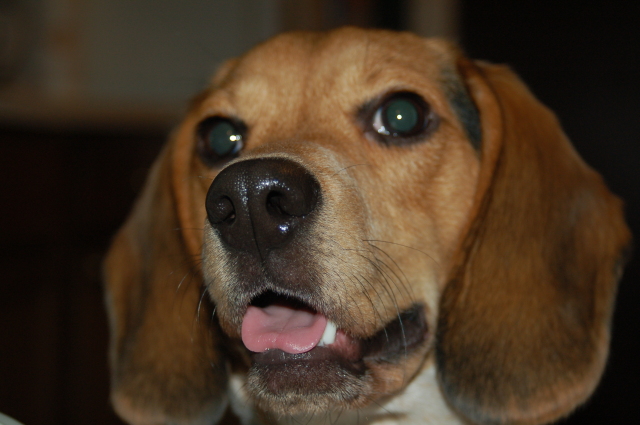 uncontrollable beagle
Question
max
My beagle is a year and a half. Ive had hi
uncontrollable beagle
Question
max
My beagle is a year and a half. Ive had hi
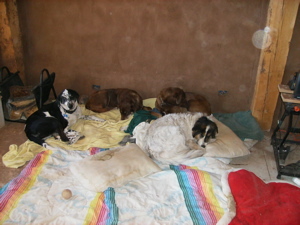 Sudden aggression within pack after a death
Question
Sudden aggression in o
We have an approximatel
Sudden aggression within pack after a death
Question
Sudden aggression in o
We have an approximatel
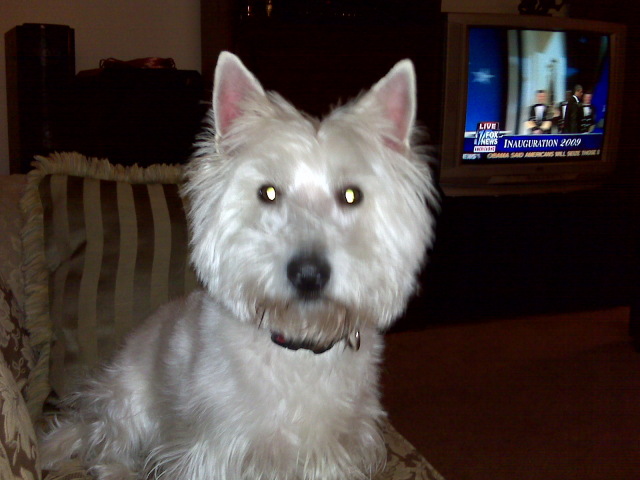 Companion for Lonley Westie
Question
Shannon
We have a 5-year-old neutered Westie w
Companion for Lonley Westie
Question
Shannon
We have a 5-year-old neutered Westie w
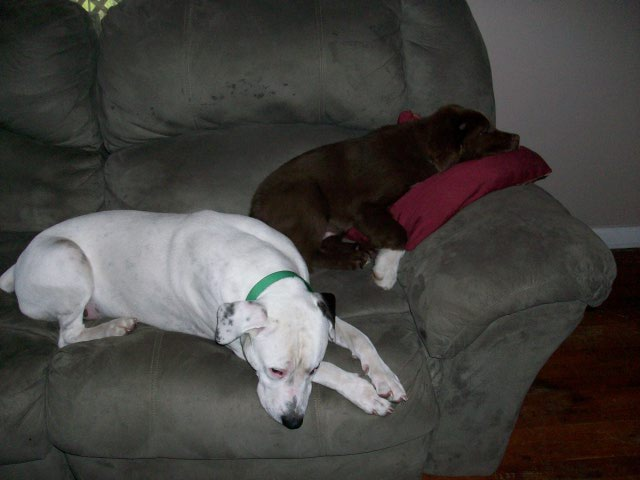 American Bulldog aggression
Question
Buddy and Rez
I have a 2 year old Ameri
American Bulldog aggression
Question
Buddy and Rez
I have a 2 year old Ameri
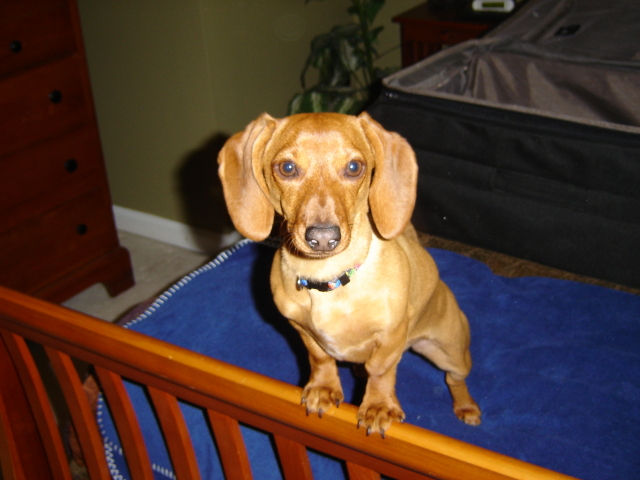 Mini Daschund with anxiety issues
QuestionAbigayle
QUESTION: I have a 3 1/2 yr old
Mini Daschund with anxiety issues
QuestionAbigayle
QUESTION: I have a 3 1/2 yr old